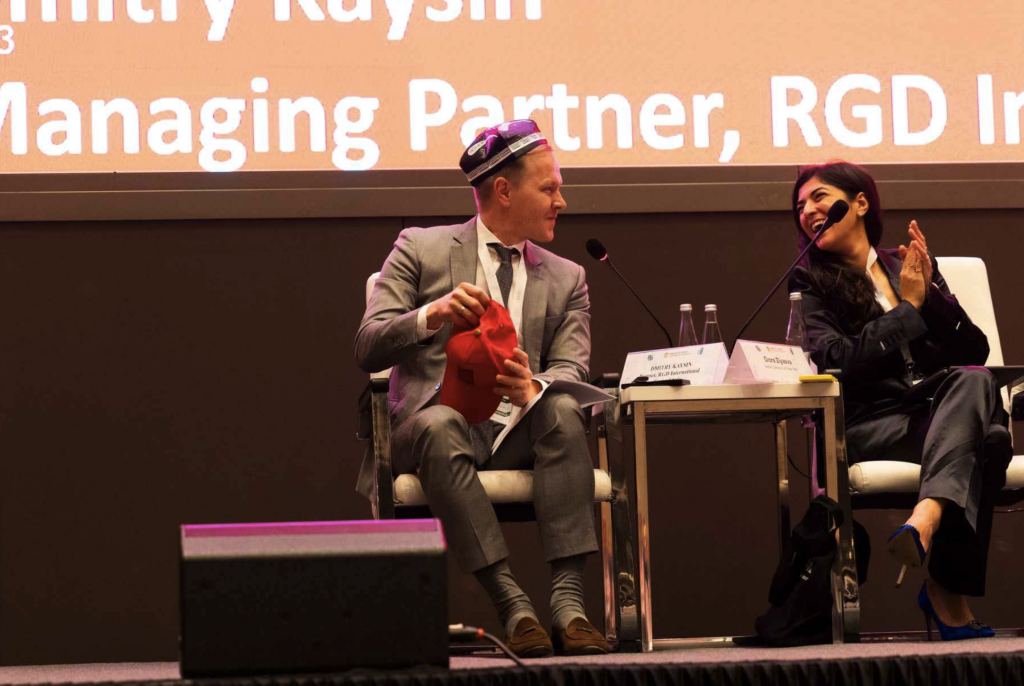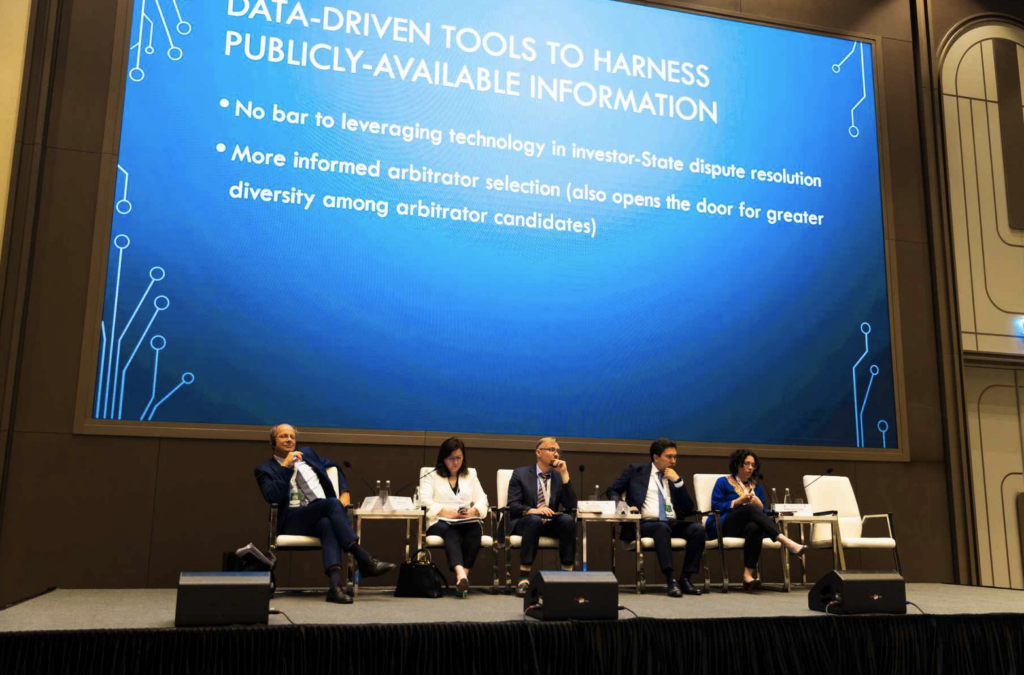The Tashkent Law Spring Forum (“Forum”), organized by the Ministry of Justice of Uzbekistan, is an important symbol of Uzbekistan’s efforts to establish itself as an open economy and an important player in global and regional markets. The inaugural forum was held in 2019 and attracted more than 1,200 participants and speakers from all over the globe. As a biannual conference, the 2021 edition was somewhat smaller, with virtual presentations owing to COVID-19-related restrictions. However, the 2023 edition, held on May 17-18, attracted more than 850 participants and speakers, causing the Ministry of Justice to have to close registrations despite continued demand. The legal and business community’s surging interest in this emerging Forum is a promising sign for Uzbekistan, including in the context of international arbitration.
Fundamental Rights and Eternal Values
The overall conference theme, Fundamental Rights as Eternal Values, was established during an in-depth opening plenary session, facilitated by Carolyn Lamm (Partner, White & Case, Washington, DC) and included keynote remarks by dignitaries from Uzbekistan, the broader Central Asian region, and elsewhere in the world, including Germany, Qatar and Singapore. The importance of the participation of these dignitaries in a legal conference in Uzbekistan cannot be overstated. Uzbekistan remains a relatively young country, with recent efforts to integrate and engage in global affairs. Conducting such dialogues in Uzbekistan’s capital represents an important step towards greater opportunities for diplomacy, the rule of law, and foreign investment.
The official languages of the Forum were English and Russian, and speakers were welcome to engage with the audience in the language of their preference, with simultaneous translation. Although the conference theme and topics covered were broad, there was significant focus on arbitration as a means of supporting such developmental efforts. Similar to what occurred at the 2019 forum, which was also covered by this blog, speakers discussed the role and future of investment and commercial arbitration and mediation, international legal principles, and best practices in the field – providing a microcosm for current issues and debates. Although more than a dozen panels were held over the course of the two-day Forum, this post highlights the discussions from the session on investment arbitration that was held on May 17. Throughout this post, we offer personal commentary and additional remarks to showcase relevant developments and perspectives from Uzbekistan and the broader Central Asian region.
Session on Investment Arbitration
Facilitated by Professor Dr. Islambek Rustambekov (Acting Rector and Professor of Law, Tashkent State University of Law; Designated Member of Panel of Arbitrators of the ICSID from Uzbekistan), the session on investment arbitration featured practitioners and scholars from around the world.
Established Challenges in Investment Arbitration
The first part of the program explored topics that reflect well-known issues in investment arbitration and featured as speakers Carolyn Lamm, Borzu Sabahi (Partner, Curtis Mallet-Prevost Colt & Mosle LLP, Washington, DC), Dmitry Kaysin(Partner, RGD International Central Asia, Moscow) and Diora Ziyaeva (Partner, Dentons LLP, New York).
Lamm kicked off the session with a discussion on third-party funding. Throughout her presentation, she emphasized the importance of examining the concerns of various stakeholders in investment arbitrations and the tensions created by those differing interests. Although not discussed specifically by Lamm, it is worth noting that third-party funding is an important issue for Central Asian states that have frequently appeared as respondents in investment arbitrations. While the Central Asian states have not been particularly active in UNCITRAL Working Group III, in October 2019, Kazakhstan submitted its comments on third-party funding and advocated in favor of regulation and disclosure of such arrangements in investment arbitration proceedings.
Sabahi presented an overview of the theories and approaches used to address and calculate damages in investment arbitrations. In an environment in which scholars are exploring the risks and impacts of awards of ‘crippling compensation’ in investment arbitrations, it is important for stakeholders to understand the theories underlying the choices and remedies available to parties in such disputes so that fact and expert evidence are properly collected and relied upon in advocacy.

Pictured Left to Right: Dmitry Kaysin and Diora Ziyaeva. Photo courtesy organizers of Tashkent Law Spring Forum.
Kaysin discussed the issues of conflict of interest, impartiality and double-hatting in investment arbitration. His presentation made use of visual effects as he engaged in a pantomime of physically switching hats to underscore the conflicts that double-hatting can imply. In April, UNCITRAL Working Group III completed work on its draft Code of Conduct for Arbitrators and earlier this month UNCITRAL adopted it during its 56th annual session in Vienna, so it is possible that the challenge of such conflicts will decrease over time. However, the overall diversity challenge in investment arbitration remains. As explored by Evgeniya Rubinina elsewhere, Central Asian states, like many others, tend to favor well-known arbitrators. This raises the question of whether there may be other arbitrators who are equally well-suited to adjudicate such disputes, especially those who may have greater familiarity with the Central Asian region, its industries, and its socio-political contexts.
Finally, Ziyaeva focused specifically on the Central Asian experience with a discussion of construction disputes involving Central Asian states as reflected in arbitrations pursued before ICSID. Over the past two decades, the region has seen a significant influx in investment arbitration, including disputes related to cross-border construction projects. Ziyaeva analyzed the trends apparent in these investment arbitrations and discussed key takeaways relevant for the region. As she discussed, Central Asian states have been involved in more than 40 ICSID arbitrations over the past two decades. Of these, significantly more were as respondent parties. Central Asian states have been the respondent in 42 ICSID cases (of which 13 were construction-related). By contrast, Central Asian investors have acted as Claimant in six ICSID arbitrations (of which two were construction-related).
Emerging Issues in Investment Arbitration
The second part of the program explored topics that reflect emerging issues in investment arbitration and featured as speakers Diana Tsutieva (Partner, Foley Hoag LLP, Washington, DC), Professor Marc Bungenberg (Director, the Europa-Institut, Saarland), Elijah Putilin (Independent Arbitrator and Counsel, Putilin Dispute Management, Tashkent) and Kiran Nasir Gore (Independent Arbitrator and Counsel, Law Offices of Kiran N Gore PLLC, Washington, DC).
Tsutieva oriented the audience to the ongoing reform discussions concerning international investment law and related dispute resolution. She presented examples of the concerns that eventually resulted in the establishment of UNCITRAL Working Group III and the ways that the working group has structured its work to ensure maximum productivity and practical effect. In particular, the working group took the early decision to focus on procedural – and not substantive – reform. Tsutieva’s presentation further focused on recent trends in substantive treaty provisions relating to climate change and environmental issues. An important topic for the region, which was not covered in this presentation, is that, while the Central Asian states have sent delegations to the working group, they have not actively participated in the discussions or submitted comments. This is in spite of the importance of these discussions to the Central Asian states as frequent respondents in such proceedings (a fact that was evidenced in Ziyaeva’s presentation focusing on ICSID disputes involving Central Asian parties in the construction sector).
Against this backdrop, Bungenberg and Putilin presented complementary remarks. Bungenberg discussed the model clauses and interpretative guidelines prepared by the European Union (EU) and the lessons that non-EU states can draw from them. Putilin, on the other hand, zeroed in on Uzbekistan’s current efforts to draft its own model BIT and provided personal suggestions to ensure that the model aligns with Uzbek interests. Both Bungenberg and Putilin emphasized the importance of using comprehensive, policy-driven models instead of piecemeal clauses borrowed from other treaties in a haphazard manner.
 Pictured Left to Right: Professor Marc Bungenberg, Diana Tsutieva, Elijah Putilin, Professor Dr. Islambek Rustambekov and Kiran Nasir Gore. Photo courtesy organizers of Tashkent Law Spring Forum.
Pictured Left to Right: Professor Marc Bungenberg, Diana Tsutieva, Elijah Putilin, Professor Dr. Islambek Rustambekov and Kiran Nasir Gore. Photo courtesy organizers of Tashkent Law Spring Forum.
Finally, Gore concluded the session with a presentation on transparency, data analytics and digital disruption in investment law and arbitration. She began by noting that each of the preceding presentations heavily drew upon data, including access to investment treaties, statistics on claims pursued under them, the outcomes of those disputes, and the actors involved (including parties, counsel and arbitrators). As such, data analytics has played a key role in facilitating various criticisms of international investment law and arbitration in recent years. Indeed, transparency, through public access to proceedings and the ability to submit amicus briefs, is a solution to some early criticisms of international investment law and arbitration. Data analytics can help parties make informed choices in selecting arbitrators and counsel. Data on past decisions and orders can also be used to enable coherent and effective arbitral advocacy and decision-making. Finally, the use of blockchain and other technologies may be explored to ensure that investment treaties, interpretive notes, and other guidance provided by states parties are applied and interpreted by users in the appropriate ways.
Concluding Thoughts
The session on investment arbitration provided a robust platform on which to engage in discussion and debate on hot topics shaping the field of investment law and arbitration at both the global and regional levels. Indeed, the value of a regional approach to examine international investment law and related dispute resolution is a key thesis point of a new book focused specifically on the Central Asian region.
Overall, the Forum provided a meeting point for global legal practitioners from various disciplines to exchange ideas and support the development of Uzbekistan’s legal and investment environment. Interestingly, various avenues are being developed to support this framework: a great example is the fact that the European Bank of Reconstruction and Development (EBRD) 2023 Annual Meeting and Business Forum was held in Samarkand at the same time as the Forum, showing that (to a certain extent at least) all roads lead to Uzbekistan.
________________________
To make sure you do not miss out on regular updates from the Kluwer Arbitration Blog, please subscribe here. To submit a proposal for a blog post, please consult our Editorial Guidelines.


